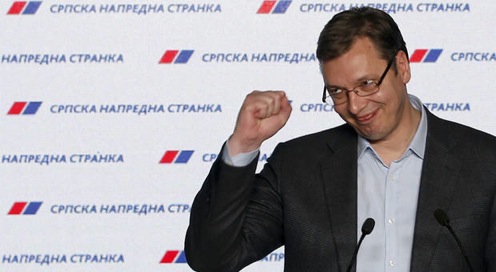

Serbian PM Aleksandar Vučić triggered early Parliamentary elections ostensibly to receive a new mandate for reforms. However, after two years in power and with the strongest support a single party (plus some minor supporters) received since 1990 (48.35%), this election was frivolous and unnecessary.
The main purpose was not a mandate for reforms but to extend the duration of the current government, to support the party in concurrent local elections, to weaken the opposition and a demonstration of power.
In fact, two anti-EU parties entered parliament, who had been at the margins of Serbian politics for years. It is curious to observe that these parties as well have learned from the previous elections not to focus primarily on Kosovo and other national issues, but rather focused on socio economic agenda that voters dominantly care for. The Radical Party, led by Vojislav Šešelj, who has been released from the International Criminal Tribunal in The Hague last year and freed in a court ruling a month ago return his party from the political wilderness to be the third largest party parliament with around 8%. The nationalist and anti-EU Democratic Party of Serbia, in coalition with Dveri, a more recent extreme right-wing group, also reentered parliament with 5%. Thus, Serbia today has a stronger anti-EU and nationalist opposition than any time since 2008.
The opposition in favor of EU-integration and continuing with reforms is divided into three parties and has just above 17% in total.
Four years after its somewhat unexpected loss of power the Democratic Party (DS) has won the primacy within the ‘democratic’ opposition with just above 6% of votes. In the meantime, it has done nothing to answer accusations of corrupt party politics, or to offer a coherent programmatic platform.
This has led to the rise of new political alternatives, primarily embodied in Dosta je bilo (Enough is enough), a programmatically consistent electoral list led by the former Minister of the Economy, Saša Radulović, which radically criticizes the influence of political parties and the economic policies of the Serbian government. The list entered the Parliament with 6% of votes, and will have a chance to impact political processes, but also to strengthen its party structure in the next four years. Alternatively, Serbia’s Left, led by Borko Stefanović, formerly of DS, failed to fill up the gap on the far left of Serbia’s politics.
The Prime Minister’s main coalition partner, MFA Ivica Dačić’s Socialists (SPS) came second in the polls with just below 11%, however their place in the new Government is all but safe. With only a 3-year break just after the fall of Milošević in October 2000, SPS has constantly been in power in Serbia via participation in governments of different stripes. Dačić personally and many of his closest allies carry the difficult burden of having allegedly taken part in corrupt activities in the past, so in case that they return to the opposition the future of the SPS does not look good.
As a result of five parties and coalitions scraping just past the 5% threshold, the ruling SNS actually holds 27 mandates fewer than at the last elections in 2014. In addition, it has failed to capture several traditionally liberal leaning and symbolically important Belgrade municipalities. Thus, while confirming the progressive party in power, this was hardly a success for a party which controls all levels of power and whose omni-present Prime Minister dwarfed everybody else in the pre-election campaigning. Today, there are around the same number of members of the ruling Progressive Party as the Communist Party in Yugoslav times—back then without competition.
Still, due to the current electoral system, the SNS has managed to capture an absolute majority in Serbian Parliament and will have an opportunity to govern alone continuing its practices of informal party politics and clientilism. With only few independent institutions, strong grip on media, weak opposition parties, and intimidated intellectual elite, there is a risk that there will be too few critical voices heard in the next four years.
The ruling party, in fact, not much more than a vehicle for the PM, who dominates the party, is not so much pro-European as it is pro-power. Vučić has seized the EU agenda, while at the same time ensuring complete control of domestic politics and using nationalist and pro-Russian positions to satisfy a more nationalist and conservative section of the electorate. He thus belongs to those semi-authoritarian rulers who use the EU-agenda and democratic processes to stay in power, but whose commitment to reform is just about as sincere as the commitment of the EU is to enlargement these days. At first glance, parties supporting EU integration account for 85% of the electorate, but this is a fallacy. The ruling SNS and its coalition partner, SPS have been opportunistic Europeans. As EU integration is growing more remote, so will the commitment to reforms. Thus, Serbia after the elections is more likely to follow the path of Macedonia than towards joining the EU.